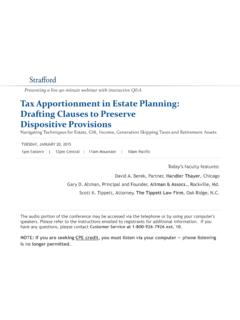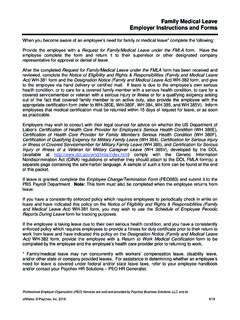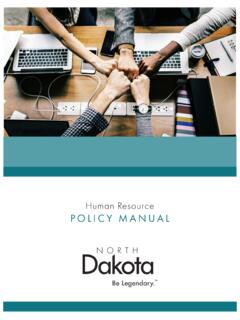Transcription of Mental Illness Under the ADA and FMLA: Avoiding and ...
1 Presenting a live 90-minute webinar with interactive Q&A. Mental Illness Under the ADA and FMLA: Avoiding and Defending Claims Determining Reasonable Accommodation and FMLA Leave;. Leveraging Expert Witnesses, Motion and Trial Strategies WEDNESDAY, JULY 9, 2014. 1pm Eastern | 12pm Central | 11am Mountain | 10am Pacific Today's faculty features: Susan K. Fitzke, Shareholder, Littler Mendelson, Minneapolis Jonathan R. Mook, DiMuroGinsberg, Alexandria, Va. Frank C. Morris, Jr., Member, Epstein Becker & Green, Washington, The audio portion of the conference may be accessed via the telephone or by using your computer's speakers. Please refer to the instructions emailed to registrants for additional information. If you have any questions, please contact Customer Service at 1-800-926-7926 ext.
2 10. FOR LIVE EVENT ONLY. Sound Quality If you are listening via your computer speakers, please note that the quality of your sound will vary depending on the speed and quality of your internet connection. If the sound quality is not satisfactory, you may listen via the phone: dial 1-866-258-2056 and enter your PIN when prompted. Otherwise, please send us a chat or e-mail immediately so we can address the problem. If you dialed in and have any difficulties during the call, press *0 for assistance. Viewing Quality To maximize your screen, press the F11 key on your keyboard. To exit full screen, press the F11 key again. FOR LIVE EVENT ONLY. For CLE purposes, please let us know how many people are listening at your location by completing each of the following steps: In the chat box, type (1) your company name and (2) the number of attendees at your location Click the SEND button beside the box If you have purchased Strafford CLE processing services, you must confirm your participation by completing and submitting an Official Record of Attendance (CLE.)
3 Form). You may obtain your CLE form by going to the program page and selecting the appropriate form in the PROGRAM MATERIALS box at the top right corner. If you'd like to purchase CLE credit processing, it is available for a fee. For additional information about CLE credit processing, go to our website or call us at 1-800-926-7926 ext. 35. FOR LIVE EVENT ONLY. If you have not printed the conference materials for this program, please complete the following steps: Click on the ^ symbol next to Conference Materials in the middle of the left- hand column on your screen. Click on the tab labeled Handouts that appears, and there you will see a PDF of the slides for today's program. Double click on the PDF and a separate page will open. Print the slides by clicking on the printer icon. Mental Illness Under THE ADA AND FMLA: Avoiding AND DEFENDING CLAIMS.
4 July 9, 2014. 1:00 2:30 EDT. Presented by Strafford Publications, Inc. Frank C. Morris, Jr. Epstein Becker & Green, PC. 1227 25th Street, NW. Washington, DC 20037. (202) 861 1880; 2014 EPSTEIN BECKER GREEN, ALL RIGHTS RESERVED. ATTORNEY ADVERTISING. The Expanded Coverage of the ADAAA and EEOC. Regulations Background A disability Under the Americans with Disabilities Act is: 1. A physical or Mental impairment that substantially limits one or more major life activities;. 2. A record (or previous history) of such an impairment; or 3. Being regarded as having a disability 2014 Epstein Becker & Green, | All Rights Reserved. | 6. Changes to the ADA. Under the ADAAA, the three-pronged definition of a disability remains the same, BUT: - the ADAAA changes how the first and third prongs are evaluated Mandates liberal interpretation of substantially limits.
5 - To maximum extent permitted by ADA. - Need not limit more than one major life activity Expanded prior definition of major life activities ( MLAs ) to include a range of activities such as: Eating, sleeping, standing, lifting or bending, learning, reading, thinking, concentrating, and communicating 2014 Epstein Becker & Green, | All Rights Reserved. | 7. EEOC's Rules of Construction: Impairments that Are Episodic or in Remission An impairment that is episodic or in remission meets the definition of disability if it would substantially limit a major life activity when active . Episodic or in remission: , Bipolar disorder Major depressive disorder Schizophrenia PTSD. 2014 Epstein Becker & Green, | All Rights Reserved. | 8. Defining Intellectual Disabilities Under the ADA. EEOC Regulations 29 (h) Physical or Mental impairment means (1) Any physiological disorder or condition, cosmetic disfigurement, or anatomical loss affecting one or more body systems ; or (2) Any Mental or psychological disorder, such as an intellectual disability (formerly termed Mental retardation'), organic brain syndrome, emotional or Mental Illness , and specific learning disabilities.
6 Full text of regulations available at 2014 Epstein Becker & Green, | All Rights Reserved. | 9. Categories of Mental Impairments Mood Disorders Depression, Bipolar, Seasonal Affective Disorder, Dysthymia Anxiety Disorders Phobias, Panic disorder, Generalized anxiety disorder, OCD, PTSD. ADHD. Schizophrenia Spectrum Disorders Physicians' source for classifying Mental illnesses: Diagnostic and Statistical Manual of Mental Disorders (5th Ed. 2013). 2014 Epstein Becker & Green, | All Rights Reserved. | 10. What Intellectual Disabilities are Substantially Limiting? According to the EEOC, the following impairments, given their inherent nature, will virtually always be found to impose a substantial limitation on brain function, a major life activity: Intellectual disability Schizophrenia Bipolar disorder Autism Major depressive disorder Post-traumatic stress disorder (PTSD).
7 Obsessive-compulsive disorder (OCD). 29 (j) (3) (ii)-(iii). 2014 Epstein Becker & Green, | All Rights Reserved. | 11. What is not Considered an Intellectual Disability? Normal sadness or grief that is brought on by a traumatic event but that is expected to pass with time ( death, divorce). Temporary anxiety due to change in circumstances at work or at home (new boss, ill family member). Personality conflicts with particular individuals at work Appropriate stress caused by work ( , deadlines). ADA's Specific Exclusions: kleptomania, pedophilia, pyromania, compulsive gambling, etc . 2014 Epstein Becker & Green, | All Rights Reserved. | 12. Is Medical Evidence Required? What can the Employer do if an Employee asks for an accommodation? Request medical documentation of Nature Severity Duration, and Extent of intellectual disability If employee does not provide documentation, employer does not have to provide an accommodation But, employer must give employee a reasonable time to produce documentation HIPAA Release, EEOC's GINA safe harbor language Caveat: Doctor/Therapist is making the diagnosis based entirely on what employee is telling him/her about work environment and is likely to be an advocate for what the patient wants 2014 Epstein Becker & Green, | All Rights Reserved.
8 | 13. Options for the Employer Challenge the Diagnosis Get a 2nd (or 3rd) medical opinion Cannot be a medical professional with whom the employer has a relationship An employee's actions may make a Fitness for Duty evaluation appropriate Determine whether employee is capable of performing the essential functions of the job and/or whether employee poses a direct threat Not a challenge to an employee's claim of disability May need to avoid negligent retention claims in some situations 2014 Epstein Becker & Green, | All Rights Reserved. | 14. Fitness for Duty Examinations Coffman v. Indianapolis Fire Dept., 578 F. 3d 559 (7th Cir. 2009). Court found employer's multiple fitness for duty evaluations of firefighter were job-related and consistent with business necessity Court cited evidence of employee' s emotional withdrawal, indecisiveness, diminished performance, and defensiveness as well as categorical rise in firefighter suicides Ward v.
9 Merck & Co., No. 06-1270, 226 F. App'x 131, 2007 WL. 760391 (3d Cir. Mar. 14, 2007). Plaintiff was terminated after he refused a fitness for duty examination and claimed the requested examination violated the ADA. The Third Circuit held that the examination was proper in light of plaintiff's increased angry outbursts at the workplace, rapid decline in conduct and in job performance following diagnoses of anxiety disorder, schizophrenia, and panic disorder 2014 Epstein Becker & Green, | All Rights Reserved. | 15. Medical Examination Anxiety and Stress Disorders Owusu-Ansah v. Coca-Cola Co., 715 1306 (11th Cir. 2013). Employer required Plaintiff to undergo a fitness-for-duty examination in order to maintain his job after banging his fists on a table and threatening his manager 11th Circuit joined the 2nd, 6th, 8th, and 10th Circuits in holding a Plaintiff does not have to be disabled to bring a claim Under the ADA's ban on most employer medical inquiries However, the court upheld the examination order because it was job related and consistent with business necessity An employee's ability to handle the reasonable and necessary stresses of his job and to work well with others are job-related requirements and essential to any job 2014 Epstein Becker & Green, | All Rights Reserved.
10 | 16. Determining Whether an Applicant or Employee with an Intellectual Disability is Qualified Test: Can the applicant or employee perform the essential functions of the job, either with or without a reasonable accommodation? Remember: Employers cannot use qualification standards or other selection criteria that screen out individuals with a disability on the basis of that disability, unless the standard, is job-related for the subject position and consistent with business necessity 2014 Epstein Becker & Green, | All Rights Reserved. | 17. Creating ADA Compliant Job Descriptions Review job descriptions to ensure they accurately reflect the extent to which communication and related skills are an essential function of a job. Be prepared with examples of the significance of effective communication skills to the position in question Remember: Inability to perform essential job functions with or without accommodation is a defense Irregular attendance Mental illnesses often manifest themselves more sporadically than physical disabilities, an employer might be asked to accommodate an employee's irregular attendance Advice: Where appropriate, job descriptions should include regular and consistent attendance as an essential function of the position Vandenbroek v.












